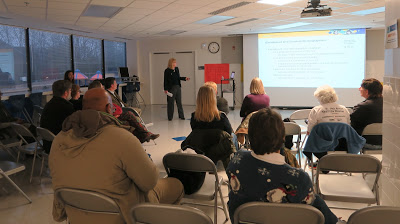School budget addresses teacher pay gap
 |
| School board member Sandy Evans talks about the FCPS budget. |
After struggling with limited budgets for years, the Fairfax County Public School is now in a good-enough financial situation that it can begin raising teacher pay to levels comparable with surrounding school systems.
The FCPS budget for FY 2019, as recommended by Superintendent Scott Brabrand and advertised by the school board, includes $44 million for step increases for teachers and other employees.
If approved by the school board, eligible employees would get a 2.3 percent average step increase, said Mason school board member Sandy Evans at a school budget town hall meeting April 3 at Bailey’s Upper Elementary School.
Teacher compensation is the key budget priority for the school board, Evans said. “We fell behind in recent years. It’s a real problem in Mason District, where teachers could go a couple of miles to Arlington and get significantly higher pay. We were concerned about losing our wonderful teachers.”
It’s the teachers at the mid-career levels who have the biggest salary discrepancies compared to their peers in other districts in the region. The increase in the proposed budget “gets us significantly closer to where we want to be,” Evans said.
In the $2.9 billion advertised school budget, 86 percent of the expenditures are allocated to instructional programs.
Enrollment is still growing, but not at the soaring rates of recent years, when the schools were absorbing 3,000 new students every year. The 2019 budget projects enrollment growth of 700 students for next year.
The schools are seeing a growth in students with more needs, however – such as special education and English language instruction – and that requires more funds.
Funding increases in the 2019 budget include $1 million for tuition reimbursement for teachers earning master’s degrees, $500,000 for preschool programs, $300,000 for math instructional resources, and $300,000 for equity resources to ensure all students get the same level of education regardless of where they go to school.
A plan for providing extra support for students who need English as a second language instruction at the most basic level will be presented to the school board in April, Evans said. About $1 million will be redirected to this program from existing resources.
The schools are seeing more students who not only don’t know English but don’t have reading skills in their own language. “When a student enrolls at age 16 and has only had one year of formal education, that is quite a challenge,” Evans said.
Revenue projections in the 2019 FCPS budget call for 71.8 percent of funds transferred from Fairfax County. Just over 16 percent of revenue would be from the state, 7 percent would be from sales taxes, and the rest would be from a variety of sources.
FCPS is expecting $22.6 million in state revenue, a 5.1 percent increase, although the General Assembly hasn’t approved a state budget yet.
That increase, plus an $88.4 million increase in transfers in Fairfax County’s advertised budget, means “we’ll be essentially fully funded for the first time in a very long time,” Evans said. “We’ll be in good shape.”
The county’s advertised budget would also give FCPS a $25 million increase in school bond sale capacity and a one-time increase of $2.5 million for school capital requirements. That would help with needed school renovations.
Renovations for Falls Church High School are finally in the planning stages, although construction is still years away, Evans said. Funds for renovation planning for the school were in the school bond passed by voters in November. Funds for construction would be in the 2021 bond.
The school board is holding public hearings on the budget May 15-16 and will adopt a budget May 24. Members of the public who want to speak at the hearing can sign up online.
In response to a question at the Town Hall about why schools in Mason District don’t have better ratings on websites such as Great Schools, Evans said: “Our schools are very high quality. Don’t be fooled by the ratings. They are wrong.”
“Those ratings are based on average test scores, while schools here have many students with low literacy levels, so of course they will have low scores,” Evans said. “Our schools are doing an excellent job with those students.”
What’s really important is whether your child has a great teacher and whether the principal is responsive, she said. “As a community we need to counter those myths. We need to get the word out about how great our schools really are.”

